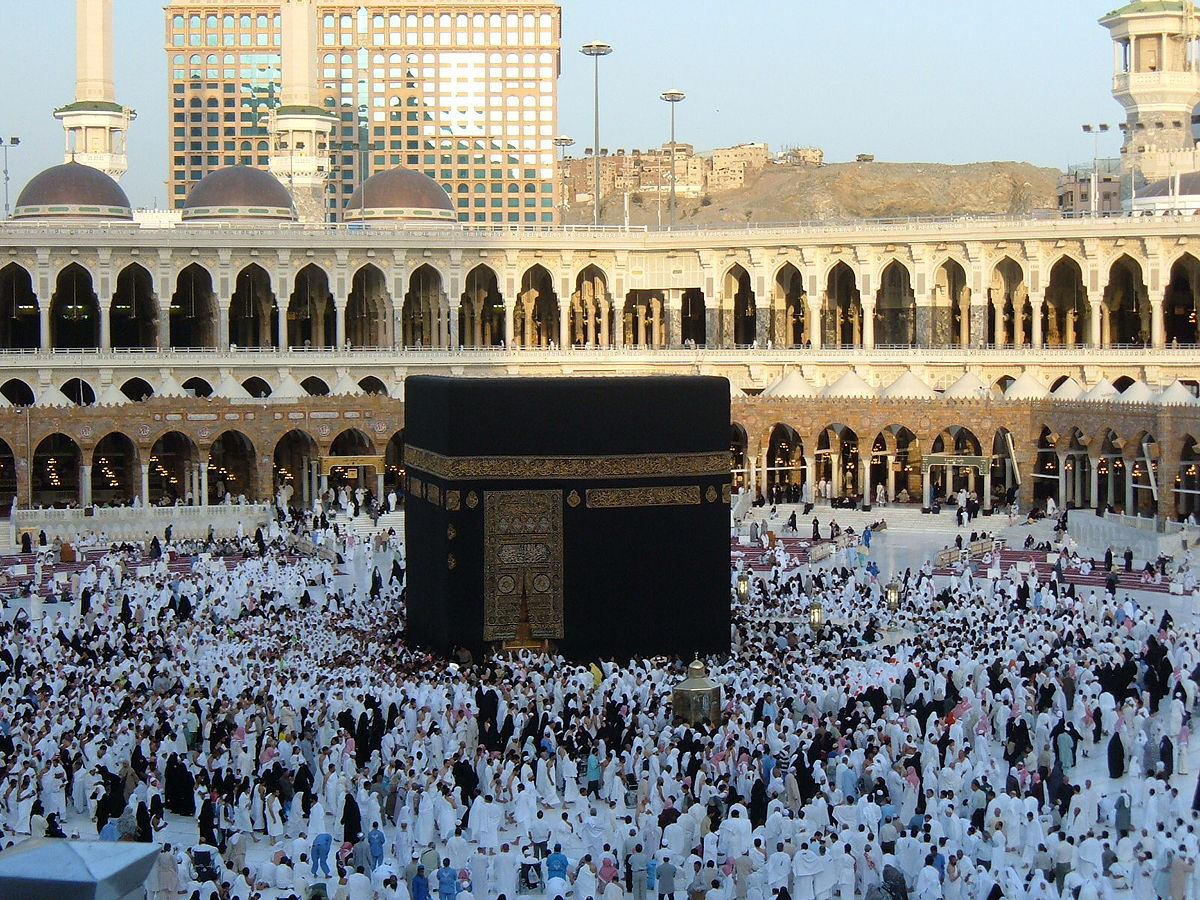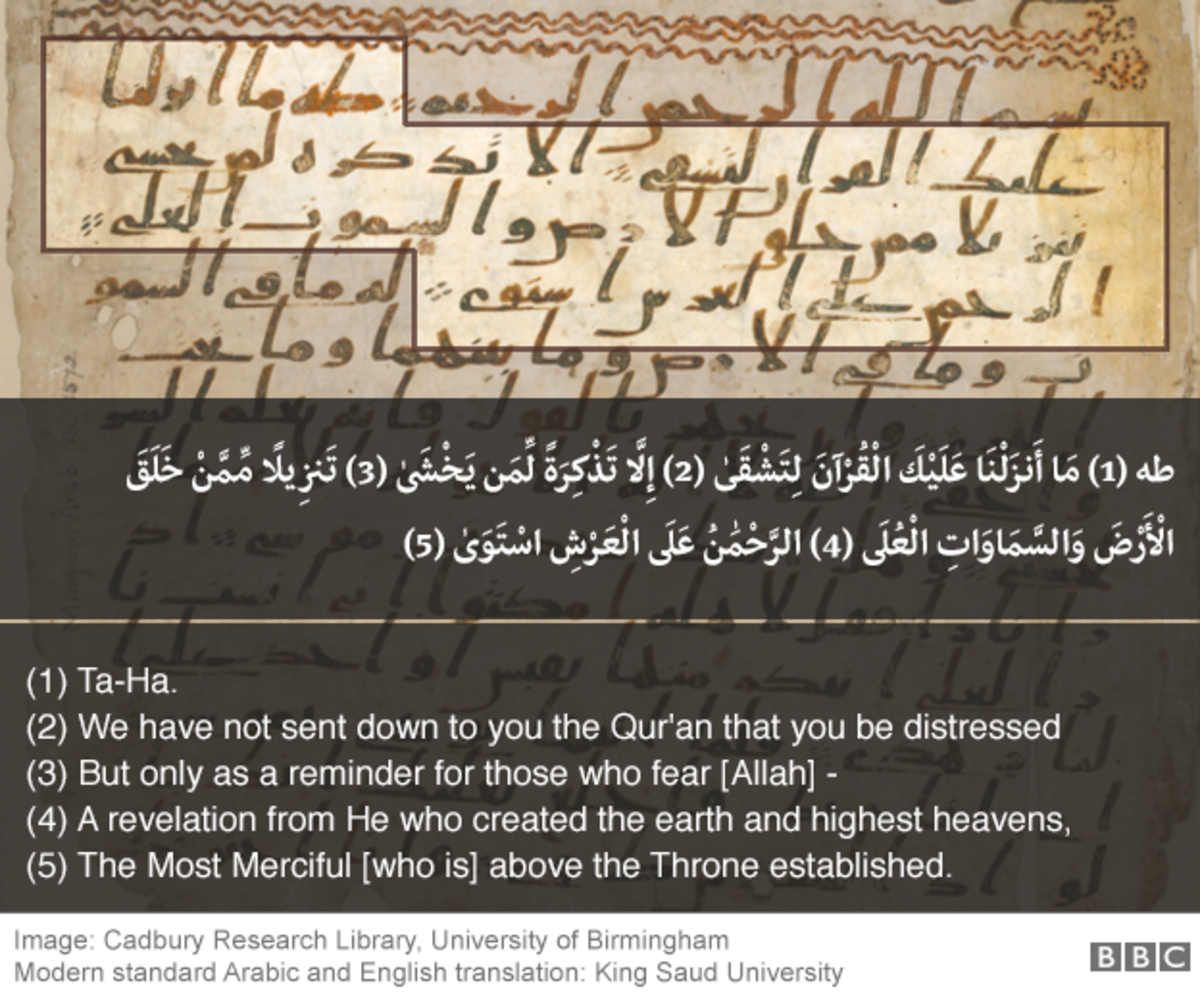What are the Main Aspects of Ritual Prayer in Islam?
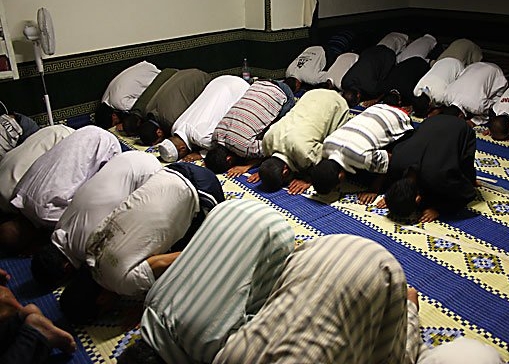
The Importance of Prayer
"Islam has been built upon five pillars: testifying that there is no god but Allah and that Muhammad is the messenger of Allah, performing the prayers, paying the zakat, making the pilgrimage to the house and fasting in Ramadan." Hadith quoted by Bukhari & Muslim
Within Islam a Muslim's actions can be divided into a five fold ranking:
- Obligatory actions are those that a Muslim is obliged to do;
- Recommended actions are those a Muslim should do;
- Permissible actions are neutral actions;
- Reprehensible actions are those which a Muslim should avoid;
- Forbidden actions are those that a Muslim must not do under any circumstance
The Five Pillars come under those actions which are obligatory for a Muslim. As the above hadith shows, prayer is listed second, coming only after the essential declaration of faith. It follows, therefore, that prayer holds a very important role in Islamic life.
Other Islam Hubs:
- Why did Muhammad Leave Makkah for Madinah?
Why did Muhammad make the journey from Makkah to Madinah? What were the factors pushing out of the holy city and why was a new life in Madinah so appealing?
Types of Prayer
Prayer can be divided into two types:
- Salah - set prayers five times a day and including the Friday Sermon
- Du'a - personal prayers
Du'a prayers are voluntary yet recommended. Because they are voluntary, Du'a prayers follow no set ritual though there are popular passages of the Qur'an that many Muslims will use for their du'a prayers. The Salah prayers are those that a Muslim is commanded to perform in the Qur'an.
"Set up regular prayers; for such prayers are enjoined on believers at stated times" Surah 4:103
As such, when performing Salah Muslims must adhere to a strict set of rituals.
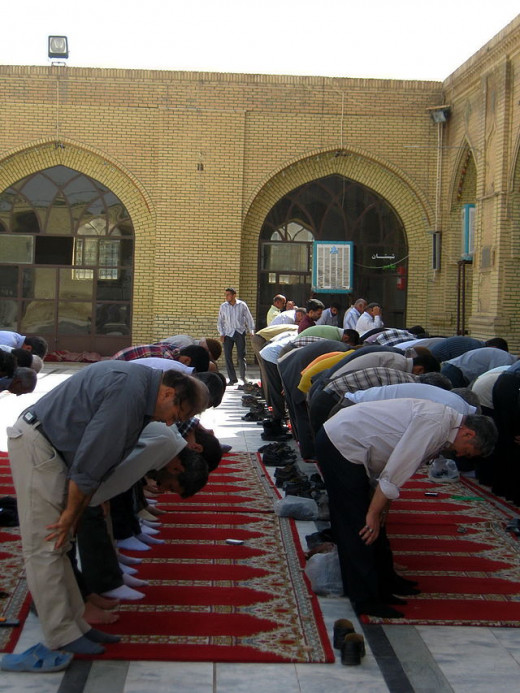
Prayer Times
Once a Muslims is old enough to perform the Five Pillars of Islam (this varies but usually around puberty, though many children will grow up performing a slightly less rigid programme of the five pillars) they must perform the prayers five times a day at set times. Salah prayers must be performed every day.
The five set times are as follows:
- Fajr- between dawn and sunrise
- Zuhr- after mid day until afternoon
- As'r - between late afternoon and sunset
- Maghrib- between sunset and the end of daylight
- Isha- between sunset and dawn
At the beginning of these set times the Mu'adhin will signal the start of prayer time by calling the adhan- the call to prayer. The adhan includes the recitation of the Shahadah, the first pillar of Islam and declaration of faith. This reminds Muslims that all the Five Pillars are combined and work together to support the religion of Islam.
How to Perform Wudu
Preparation for Prayer
Before a Muslim can perform the ritual prayer they must carry out certain preparatory measures. This is to ensure they enter into prayer in both a sound physical and mental state.
The main physical preparation is wudu, the ritual wash. Wudu requires that a Muslim wash her hands, arms, feet, face, nostrils, ears and head three times each in running water. There are some circumstances when wudu will not suffice and instead a full ritual ablution known as ghusl is required. Ghusl involves a full bath and is required after sexual intercourse, menstruation, child birth or touching a corpse.
In situations where a Muslim has no access to water they may perform wudu using sand or simply perform a symbolic wash known as tayammum.
You can watch a guide to how wudu is performed in the video above.
As well as the body, clothes should be clean and no makeup or perfume should be worn. A man's body should be covered from at least his navel to his knees. A woman's body should be covered completely with the exception of her feet and hands. All worshippers should wear modest dress so as not to draw attention away from the prayers and Allah and ensure the mind has no external distractions.
Muslims should try to pray in a clean area and of course performing salah as the mosque in congregation with fellow Muslims is the most pleasing to Allah. However, the demands of the five daily prayers mean it is not always possible to attend mosque for prayers and a Muslim can pray at home, at work or indeed anywhere that is clean and gives the worshipper enough space to prostrate himself.
If a Muslim is on a journey they can carry a prayer mat with them to ensure they always have clean and comfortable space to prostrate themselves on and perform the actions that make up salah. Many Muslims also keep a prayer mat at home or at work for this purpose.
Once the physical preparations have taken place there is one final mental preparation to take place. This is known as the niyyah and is the declaration of intent. It is a small prayer that states the worshippers intent to pray and stops salah becoming a meaningless ritual. It also helps get the worshipper in the right frame of mind.
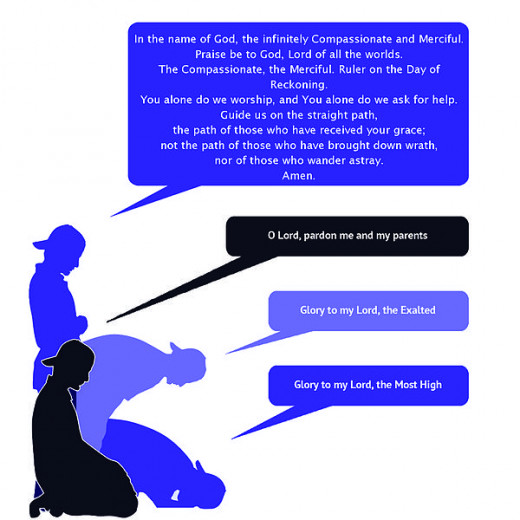
The Set Words and Actions
Salah prayers follow set words and actions. Each cycle of actions is known as a rakah and all Muslims at prayer will follow the same words and actions. The words used in Salah are always spoken in the language of the Qur’an, Arabic so all Muslims across the world perform identical prayers.
The first rakah is called Takbir here the hands are lifted to the ears while the words "Allahu Akbar" are recited. This means Allah is the greatest. The action is symbolic of shutting out the world and putting everything behind you.
The second rakah involves placing the right hand over the left hand on the chest and reciting Surah 1 Al Fatiha. This is the first chapter of the Qur'an and sums up a lot of the main Islamic beliefs. This is usually followed by a few Quranic verses praising Allah. The symbolism here is bringing God to your heart but also that the worshipper is humbled.
The third rakah is known as Ruku. Here the Muslim bows and repeats the words "Allahu Akbar, Glory to my Lord the Greatest" three times. Note this will be said in Arabic. This rakah shows respect for God.
The fourth rakah, Qiyam, is again done as a sign of respect. The worshipper stands upright and says "Allah has heard all those who praise Him our Lord: Praise be to Thee"
The final three rakahs are all representative of the Muslims complete submission to Allah. They involve prostration, kneeling up and turning the head. It is here that a Muslim will say tashahhud, a prayer requesting peace for Muhammad and the prophets of God.
All the raka't (plural for rakah) consist of three different types of prayer:
- Fard- this is the obligatory element of the rakah and must be performed for the prayer to count towards salah
- Sunna- These are optional extra prayers and recitations following the example set by prophet Muhammad
- Nafrilla- Totally optional and extra to those even Muhammad performed
If a Muslim cannot perform her prayers for whatever reason she is permitted to make them up at the next prayer time.
Step by Step Instructions for Performing Salah
Friday Prayers
Friday is the holy day in Islam and all male Muslims are obliged to attend the Friday lunchtime prayers (Zuhr) at Mosque. This are known as the Juma Prayers and it is a chance for Muslims to come together as a congregation. Congregational prayer is very important in Islam as it is an outward sign of the Islamic ummah or community.
Although women are not obliged to attend they are welcomed and encouraged to attend as well. Men and women must pray in separate areas of the mosque to ensure there are not distractions from Allah.
The Friday prayers are accompanied by a sermon known as a Khutbah which is usually delivered by the imam.







